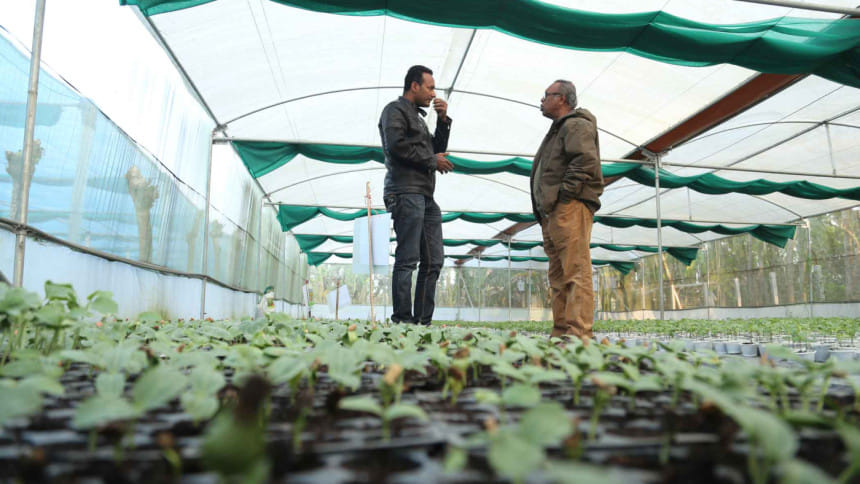Commercial prospect of saplings

Once upon a time, seeds were the only source to grow the crop and farmers who had more seeds were the richest. When I started my journey of agricultural journalism in '80s, I witnessed agriculture was confined only in paddy and jute. Other vegetables were used to be cultivated on the home yards of the farmers while some on the fields in a brief manner. The purpose of cultivating these crops was to meet the needs of the family; there was no commercial purpose. Farmers used to store seeds of various crops, starting from paddy and jute, according to their needs. Due to over population, the demand to grow more crops increased. Scientists created more productive seed varieties. The problem rose even more with the demand of seeds for high yielding varieties. Traditionally, farmers used to store and save their own seeds for the season, but as the newer hybrid and super-hybrid varieties of seeds came into play, they could save no more. Seeds gradually went into the hands of multinational companies and farmers became entirely dependent on the seed market. There was another problem where farmers battled with getting better sapling from the poor-quality seeds. Farmers complained against some seed companies and also Bangladesh Agriculture Development Corporation (BADC) at an open dialogue session between farmers and policymakers in Krishi Budget Krishoker Budget (Farmers' Voices in Budget).
In 2019, winter came a bit late, but this year during the month of December, it's taking time for the winter to finally enter the city areas, especially Dhaka. However, it has become quite cold in the suburbs and remote villages of the country. I was filming in Jashore and while returning, I saw a big net shade, called Maxim Agro in Churamonkathi. I got out of the car and went inside the shade. What I found was a complete and organized agricultural shade. Talking to the staff working there, I came to know that they were producing saplings for different vegetable crops in the net house. Rabiul Islam, production manager of the company, gave me a brief on different works they're doing. They are producing and marketing saplings for broccoli, papaya, cabbage, cauliflower, etc. The process of sapling production is basically soilless agriculture. The main medium is coco peat. Traditionally, a lot of vegetables are produced in Churamonkathi, Haybadpur and Barobazar in Jashore. There are many old vegetable markets in Barobazar. Farmers produce vegetable saplings in a traditional manner. As the main vegetable supply area of the country, there is a huge demand for vegetable saplings there. Healthy, good quality and high yielding vegetables are the main demand of the farmers to ensure the yield of high value crops and fruits.

Considering the huge demand for vegetable saplings in Jashore, Shariful Amin, an agricultural entrepreneur, took the initiative to commercialize the most significant agricultural input. Amin got engaged with farming from the thought of producing safe food. Then he saw that getting quality saplings is a big crisis. He started the work of sapling production with an aim of overcoming the crisis. Amin is a businessman who understood exactly how to do the commercialization of saplings, seeds and seedlings while ensuring a very good quality. Keeping the farmers' needs in mind, he started producing various vegetable saplings. Agro-entrepreneur Amin said farmers in Jashore region are more interested in buying ready-made saplings than making their own, because they want to save more time. Doing different vegetable saplings, Amin has tremendously become successful in the trade.
Sapling production and trade is an ancient agricultural enterprise. In different parts of the country, I am getting news of new initiatives to make soilless saplings in net house. Such initiatives give a hope of new employment opportunities. Also, such initiatives ensure good quality saplings for farmers. We need to focus on the wellbeing of farmers, so that the saplings can also help them to contribute to the sustainable economy of the country.

 For all latest news, follow The Daily Star's Google News channel.
For all latest news, follow The Daily Star's Google News channel. 



Comments